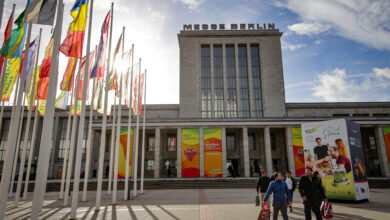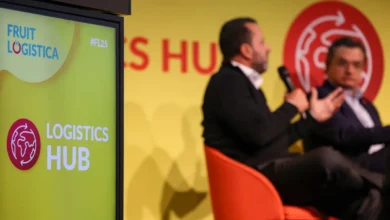The Israeli Potato Market
The annual show of potatoes held at the Negev displayed an array of foreign varieties

Yossi Arzi, who is the general secretary at the Israeli Vegetable Growers Association (and represents the kibbutzim) stated: the Israeli market demands a large potato with a smooth peel that is light colored and its appearance pleasant to the eye. The taste is unimportant. Such is the behavior of the Israeli consumer and I only wish that they would think differently.”
Seed production companies from all over the world, including countries such as the Netherlands, Scotland, Germany, France and Denmark have airlifted new varieties of this vegetable to Israel, so that they can be carefully tested here and the decision made as to their suitability for growing and marketing commercially. The companies which send these varieties to Israel are convinced that these delivered varieties are suitable for other countries in the Mediterranean Basin too. Therefore, Egypt, Saudi Arabia and Iraq also receive varieties identical to those sent to Israel.
The annual show of potato varieties was held this year at the social club at Kibbutz Erez for the 25th successive year. Dozens of growers, as well as active members in the Israeli Vegetable Growers Association, the Plants Production Marketing Board and the Professional Training Service of the Israeli Agricultural Extension Service, Plant Protection and Inspection Services all visited the clubhouse’s grounds where they saw at first hand the initial presentation of the foreign varieties, which they are seeking to acclimatize in this country.
Yossi Arzi, a member of the Kibbutz movement who grew up in Kibbutz Erez and currently serves as the general secretary at the Israeli Vegetable Growers Association emphasizes the fact that the European varieties are no different from those grown in Israel, but “they are sometimes more appealing and have a greater resistance to diseases. The annual show’s purpose was to display new varieties to be grown by the local growers. The goal here is that the maximum number of Israeli growers will decide to grow the maximum range of varieties.”
Arzi also noted that the strict plant protection regulations do not permit imports of potato bulbs from every country and “imports from England and Belgium are prohibited. One or two of the varieties currently under review may be available commercially in 4-5 years time.”
Thousands of different potato varieties are grown worldwide and “Last year we brought 150 varieties to be grown and many of them were well acclimatized. The commercial growth is quite regular and requires the same accepted irrigation system.”
The Israeli market consumes 280 thousand tons per year while industry requires another 80 thousand tons. The recurrent exports amount to a quarter of a million tons. We export to Western Europe and also to Russia and even allowing for the obstacles we succeeded in exporting to Russia about 80 thousands tons after paying the import taxes. The revenue from the sales of potatoes from Israel totaled about 250 million Israeli Shekels. When it comes to quantities this is the number one agricultural export crop while in terms of the individual grower’s income growing peppers heads the list.
During the current season 16.4 thousand hectares were planted with potatoes and the fall plantings of potatoes accounted for 7.8 thousand hectares of this area and the yield was earmarked mostly for export while the remaining area of about 8.7 thousand hectares were planted in the spring.
Potato exports are one of Israel’s largest and most important agricultural export crops in general and export vegetables in particular. This year saw an increase of 1000% in the exports to Russia and the average crop over several years is 24 thousand tons. The Russian market does not constitute a primary export market as most of the crops’ exports are earmarked for marketing to Europe and the British Isles. Following the ongoing Russia-Ukraine crisis imports of agricultural produce from Western Europe into Russia were suspended and together with the delay in the supply of fresh potatoes from local Russian growers a window of opportunity was opened up for Israeli growers to export their produce to Russia in quantities of about 80 to 100 thousand tons. The relative share of the exports to Russia increased from 4 percent during the past season to 37% of all the potato exports from Israel. Despite the impressive increase in exports to Russia there was no corresponding increase in the number of exporters. This figure is indicative of the considerable difficulty encountered when exporting to Russia.
Source: “Yevul Si” (magazine), published on September 30, 2014.




